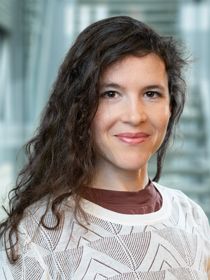Dr. Lea Müller-Funk was elected to the Young Academy for eight years in April 2025. She is thus one of eight new members of the sub-organization of the Austrian Academy of Sciences, which has up to 70 members. As a senior researcher at the University for Continuing Education Krems, she researches aspects of the migration process in the context of flight and displacement as well as migration policy issues. Her regional focus is on the Middle East, North Africa and Europe. Müller-Funk is also involved in science education as an ÖAD science ambassador.
Dr. Lea Müller-Funk has been a senior researcher and Elise Richter Fellow at the Department for Migration and Globalisation at the University for Continuing Education Krems since 2022. Prior to this, she held postdoctoral positions at the Universities of Oxford and Amsterdam and at the GIGA German Institute of Global and Area Studies. She studied comparative political science and Arabic studies at the Centre des Recherches Internationales (CERI) at Sciences Po Paris and at the Department of Near Eastern Studies at the University of Vienna. She wrote her dissertation on “Transnational Politics Beyond the Arab Uprisings. Egyptian Activism in Vienna and Paris”.
“I see my membership in the Young Academy as an opportunity to give young scientists in Austria a voice. It is particularly important to me to highlight inequalities in access to research and science as well as precarious working conditions and to counteract them,” said Müller-Funk on her admission to the Young Academy. She added that the Young Academy also provides an important interdisciplinary space that allows ideas to be developed in exchange with scientists from other disciplines. Last but not least, the visibility of this institution also strengthens the dialogue between science and society, according to the migration researcher.
Müller-Funk's current research project SYREALITY (Syrian Imaginations of Europe meet Reality) focuses on the group of Syrians who have come to Europe since the outbreak of the Syrian conflict in 2011. The project centers on the question of how their life plans have changed as a result of their experiences as refugees and what role socioeconomic factors play in this.
In September 2025, Müller-Funk will begin the project RESTATE (Refugees' Political Participation and State-(Re)Making in Displacement), for which she received an ERC Starting Grant. In this project, she will investigate how refugees perceive the state and state institutions before, during, and after their flight, and how these experiences influence their political participation. The aim is to develop a dynamic understanding of these interactions, analyze the effects of state violence on trust in institutions, and theorize the conditions and consequences of political participation by refugees. To this end, refugees from Afghanistan, South Sudan, and Syria who have settled in the four important host countries Iran, Turkey, Uganda, and Germany will be interviewed.
Making science accessible to young people
In addition to her research, Lea Müller-Funk is strongly committed to science communication. For example, her National Geographic-funded project TIES aimed to present the latest research findings on migration and displacement to school students in an educational format. The multimedia teaching modules, created by researchers in six different languages, are suitable for 14- to 18-year-olds and can be used in geography, history, and social studies classes. As a science ambassador for Austria's Agency for Education and Internationalisation (ÖAD), she is also committed to bringing migration research findings into Austrian classrooms. For Müller-Funk, the program is an important initiative to strengthen trust in science and an opportunity for the all-important early exchange with children and young people about research.
Strengthening innovative fields of research
The Young Academy consists of up to 70 members and aims, among other things, to strengthen innovative fields of research and help improve the framework conditions for young scientists. The association is also represented in various committees of the Austrian Academy of Sciences. Members of the Young Academy are established scientists who are accepted through election by the Young Academy and confirmation by the Academy as a whole. A prerequisite for admission is the award of important research grants or scholarships.
Contact
Tags
-Mijail%20Figueroa%20Gonzalez.jpg)
